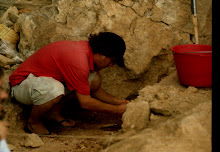Last week, I mentioned that scientists - in this case, specifically anthropologists - need to develop strategies to better control the narratives about their research that get circulated in popular media. To me, the need to do so is spurred by both the public interest in anthropological research as well as the need to make science relevant, interesting and exciting to a broader swath of society than it currently is. I also think that scientists have a duty to reach out to the public and talk about what it is they do and why it matters. Really, we need to be able to do this no matter how narrow and specialized our specific field on inquiry. In part, I feel it's the minimum we can do considering the amount of public funding most of us get for our research. As well, if we hope to get the public excited about the scientific inquiry and kids about careers in science, making efforts and taking steps to reach broader audiences should not only be commendable, it should be a professional imperative.
The fine folks at
Scientific American seem to be thinking along very similar lines. Under the aegis of the Nature Publishing Group, they're spearheading an effort called "
1,000 Scientists in 1,000 Days" that "aims to help with all of those goals by making it easier for scientists and teachers to connect. The idea is simple. We seek scientists who are willing to volunteer to advise on curricula, answer a classroom's questions, or visit a school." They have a sign-up sheet for interested scientists - including a category specifically for anthropologists! - and they'll take care of matching interested parties with interested schools in their area. Sounds like a win-win to me, and you only have to volunteer as much as you are comfortable or able to. Get to it, folks!

No comments:
Post a Comment